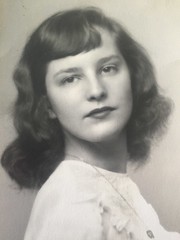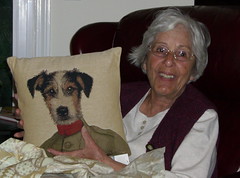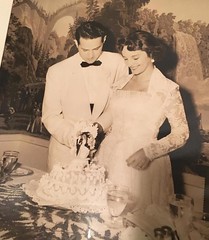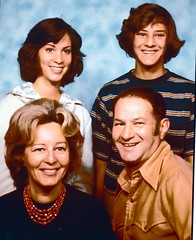A few memories of Tante Elayne. We called her “Tante”, which means “aunt” in French and German and Yiddish.
Tante was a proud New Yorker. Her heart never left New York, and neither did her voice. Both Tante and Unc lived her over 50 years and never lost their New York accents. We'd say, “Tante, we saw a hawk in our yard this morning.” “A what?” We'd show her the picture and she'd say “oh, you mean a hawwk. When you said 'hock' I thought you were talking about a piece of ham.”
Tante was a vocal right-winger. When asked about her politics, she'd smile and say “You know Attila the Hun? I'm to the right of him.” “My grandfather was a Republican,” she growled proudly, “he hated FDR even from when he was governor of New York.” Like Archie Bunker, she was blunt and not the least "politically correct", but like Archie, she was a lovable curmudgeon. Sunday night family dinners were always lively, as we knew well how to push each other's buttons. She was often outnumbered, but she always stood her ground.
Tante was not an early adopter of technology. It was ages before she was convinced to get an answering machine (not voicemail, mind you, but the machine with the cassette tape in it), and it was only a couple years ago she finally conceded to allow a microwave oven into her kitchen. “There's no room on my counter.” When the Fresh & Easy market went in down the street, with exclusively self-service check-out, the manager got to know Tante & Unc very well, because they'd always call him over and say “we don't know how to do this machine thing, you have to do it for us.” As inquisitive and interested in the news as Tante was, you would think she would love the Internet, but when we suggested it, she got such a pained, horrified look on her face. “What on earth would I do with the Internet?” She was content enough for us to bring our iPhones to Sunday dinner so we could show her pictures from Facebook of what her grandchildren were up to. And she'd ask us to look things up for her. Mostly about her favorite radio personalities. It's no small irony that we were hampered in sharing the Internet with Tante by the fact that this house is a total dead zone for AT&T, as if there's an anti-technology force field protecting the house.
Tante claimed to be anti-social. She didn't use that word, she had better SAT words. She taught me the word “dour” when I showed her a photo of some 19th century ancestors who looked particularly stern and forbidding. “Look at those dour expressions”, she said approvingly, “my kind of people.” If you asked her if she liked meeting people, she would say “no, dear, I am a misanthrope.” In truth, though, she would talk to anybody, and she loved getting people's stories. When we'd go out to eat, as soon as she finished, she'd excuse herself to go smoke a cigarette out behind the restaurant, and she'd often come back having met someone, and she'd have gotten their whole life story. She would meet friends of mine even just once or twice, and she'd interrogate them, learning things I didn't always know. She wasn't just being polite, she was interested, and she would remember. Not names, so much, but she'd remember stories. Even years after she'd met someone once, she'd ask about them -- whatever happened to your friend the architect, or that one with the young daughter with cataracts, how is she? Some misanthrope.
Tante loved eating. She ate with gusto. And she was a gracious guest. She would always compliment the meal, earnestly and enthusiastically. Even at our very casual Sunday family dinners, she would exclaim with delight about knockwurst and cabbage, as if she were trying the dish for the first time. Of course, my Mom's knockwurst and cabbage is really good. We all love it, but Tante was always the first one to say so. She had a gift for expressing appreciation. “Oh George, you're clearing dishes again, you don't have to do that, you're such a help.” “Oh Thomas, you brought me blueberries, I love blueberries, and so good for you!” A couple years ago, when they needed some extra help, their granddaughter Rachel chose to take her spring break out here helping them. Rachel, you must have heard that appreciation. We sure heard it afterwards. “Oh that Rachel, she's such a help! And such a good cook!” Part of that might have just been a good upbringing by Elayne's mother, who never left the house without her hat and gloves. But Tante always expressed her appreciation so heartily, as if you were the first person to ever clear a dish or bring her an apple. It was a gift, and a good lesson.
Sunday night dinners will never be the same without Tante oleha sholom, v zichronah livrakha (peace be upon her, and may her memory be for a blessing).
Monday, June 27, 2016
Tante Elayne -- Life Sketch
Elayne was born on Feb 18, 1931, in the Bronx, New York City, the daughter of Paul and Rhea Taylor. Her mother's side of the family, the Brantmans, were Jewish. Her grandparents, Louis and Betty Brantman, were eastern European immigrants who met in New York City, and re-enacted Fiddler on the Roof with their family of five daughters, each daughter pushing the boundaries of their father's traditional views a bit further. Paul Taylor, from a line of Taylors going back nearly to the Mayflower, and ancestry entirely English and Scottish, was obviously not Jewish, and not Louis' idea of a perfect match for his daughter, but when Paul agreed to study for two years to convert to Judaism, Louis consented to the match. When Elayne was born, her grandfather registered her birth in temple, where she was given the Jewish name Sarah.
Elayne was Paul and Rhea's first daughter. A year and a half later came Cecile, and for their whole lives, those two would be as close as any two sisters ever were. Their early childhood was the midst of the Great Depression, and their family was as hard hit as any. Paul was an accountant working in Manhattan, and in the late 1920s, when the stock market looked like it could only go up, he had put most of his and his family's money into it. When the girls were very young, Rhea's parents both passed away, and Paul moved his family to New Jersey, where they could be closer to Paul's parents, and his brothers Frank and Don. For a time, the whole extended Taylor family was sharing one house, but later in the 1930s, Paul found steady work at a casting company, and the family had their own home in Great Notch. The girls had a good time there, and used to play on the train cars parked at the station near their house.
By 1941, Elayne's father, who had gone to a military school, was eager to take his part in World War II. The US hadn't joined the war yet, so Paul went up to Canada and enlisted with the Royal Canadian Artillery, where he soon shipped out and spent the rest of the war in the European theater. Rhea, left alone with two young daughters, moved to an apartment in Kew Gardens in Queens, where she could be closer to her sisters Nina and Fanny, and their families. For a time, Aunt Fanny and Uncle Sam lived upstairs in the same building. Nina had two daughters, Carol and Betty, just a bit younger than Elayne and Cecile. After the war, Paul chose to stay in Canada rather than return to his family. Rhea, Elayne, and Cecile lived in that same apartment in Queens throughout the 1940s and most of the 1950s. Elayne and Cecile had happy teenage years there, spending time with family, attending Forest Hills High School, going to social events at the Jewish Community Center, and sometimes going in to the city with their mother, who reportedly never left the house without hat and gloves. When Elayne was about 20 years old, it was at one of those events at the Jewish community center that she met Harold Hess, the handsome elder son of a shopkeeper in Forest Hills. No one remembers exactly how long they courted. Unc Harold says "We met at the party, she invited me home to meet her mother, she was nice, and that was it." The one thing that Harold and Cecile both remember is that when Elayne brought Harold home to meet the family, he offered to fix a broken window shade, but ended up pulling the whole thing down on his head.
Elayne and Harold were married in August 1952, with a reception at the Forest Hills Inn, attended by family including all four of their parents. They moved into a small house on Harmony Drive in Massapequa on Long Island, nearby to her cousin Dottie Stetter and her young family. They enjoyed life in Massapequa, and made a lasting friendship with a neighboring family, the Amendolas. By the end of the 1950s, they had two children, Donna and Victor.
Meanwhile, Elayne's sister Cecile had moved out west, where she met her husband Rod Chatt, and settled in Granada Hills, where the suburbs of LA were just starting to push into the orange groves of the San Fernando Valley. Much as Elayne loved New York, she didn't want to be apart from her sister, and so in 1964, the Hesses moved to Granada Hills. They lived briefly in an apartment on Devonshire, and then moved into this house that is still their home after 50 years. Donna and Victor went to the elementary school right across the street, then Frost Jr High, and Kennedy High, which was built just in time for Donna to attend. The Hesses found more lifelong friends in this neighborhood, including the Hagawaras and the Hillbergs. (Like the Hesses, the Hillbergs are settled people, still here after 50 years.)
While Harold established his window-washing business, Elayne became quietly involved in the community, attending neighborhood watch meetings, and volunteering to be precinct captain of the local election board. But she mostly devoted herself to three great passions. One, she cleaned her house. Constantly. Her house was always immaculate. Two, she listened to conservative talk radio. She never quite warmed to the TV. The TV was fine for Masterpiece Theatre, for Jeopardy, and for Dancing with the Stars. But when it came to politics, for her, all the best people worth listening to were on the radio.
Elayne's third and greatest passion, of course, was rescuing animals. For the first 15 years they lived here, there was just a big open field from here to Balboa, at the end of the valley, a place where thoughtless people would dump unwanted pets. Her first rescue was Penny, an orange tabby who showed her love by bringing her mother trophies she'd catch in the field: birds, rats, gophers, all were no match for Penny. Elayne was particularly fond of Staffordshire bull terriers, more commonly known as the much-maligned "pit bull", and she took in several pit bulls over the years that had been mistreated by prior owners. When her house was filled with pets, she then filled her sister's house too. Many of the Chatts' pets were Elayne's rescues. And if you've seen their menageries, you know that clearly Donna and Victor have both inherited their mother's big heart for animals.
Elayne liked her life guided by routine. 9pm phone calls every night with her sister. Going out every Saturday night with the Chatts. Family dinner every Sunday at the Chatt or the Hess home. Getting together the whole family on Thanksgiving and Christmas. Visits every summer by Donna and her kids. I think she would like to be remembered simply, as faithful to her family, as a good neighbor and citizen, and as a lover of animals. And for 85 good years, that's exactly what she was.
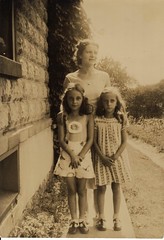 |
| Elayne with her mother and sister |
By 1941, Elayne's father, who had gone to a military school, was eager to take his part in World War II. The US hadn't joined the war yet, so Paul went up to Canada and enlisted with the Royal Canadian Artillery, where he soon shipped out and spent the rest of the war in the European theater. Rhea, left alone with two young daughters, moved to an apartment in Kew Gardens in Queens, where she could be closer to her sisters Nina and Fanny, and their families. For a time, Aunt Fanny and Uncle Sam lived upstairs in the same building. Nina had two daughters, Carol and Betty, just a bit younger than Elayne and Cecile. After the war, Paul chose to stay in Canada rather than return to his family. Rhea, Elayne, and Cecile lived in that same apartment in Queens throughout the 1940s and most of the 1950s. Elayne and Cecile had happy teenage years there, spending time with family, attending Forest Hills High School, going to social events at the Jewish Community Center, and sometimes going in to the city with their mother, who reportedly never left the house without hat and gloves. When Elayne was about 20 years old, it was at one of those events at the Jewish community center that she met Harold Hess, the handsome elder son of a shopkeeper in Forest Hills. No one remembers exactly how long they courted. Unc Harold says "We met at the party, she invited me home to meet her mother, she was nice, and that was it." The one thing that Harold and Cecile both remember is that when Elayne brought Harold home to meet the family, he offered to fix a broken window shade, but ended up pulling the whole thing down on his head.
Elayne and Harold were married in August 1952, with a reception at the Forest Hills Inn, attended by family including all four of their parents. They moved into a small house on Harmony Drive in Massapequa on Long Island, nearby to her cousin Dottie Stetter and her young family. They enjoyed life in Massapequa, and made a lasting friendship with a neighboring family, the Amendolas. By the end of the 1950s, they had two children, Donna and Victor.
Meanwhile, Elayne's sister Cecile had moved out west, where she met her husband Rod Chatt, and settled in Granada Hills, where the suburbs of LA were just starting to push into the orange groves of the San Fernando Valley. Much as Elayne loved New York, she didn't want to be apart from her sister, and so in 1964, the Hesses moved to Granada Hills. They lived briefly in an apartment on Devonshire, and then moved into this house that is still their home after 50 years. Donna and Victor went to the elementary school right across the street, then Frost Jr High, and Kennedy High, which was built just in time for Donna to attend. The Hesses found more lifelong friends in this neighborhood, including the Hagawaras and the Hillbergs. (Like the Hesses, the Hillbergs are settled people, still here after 50 years.)
While Harold established his window-washing business, Elayne became quietly involved in the community, attending neighborhood watch meetings, and volunteering to be precinct captain of the local election board. But she mostly devoted herself to three great passions. One, she cleaned her house. Constantly. Her house was always immaculate. Two, she listened to conservative talk radio. She never quite warmed to the TV. The TV was fine for Masterpiece Theatre, for Jeopardy, and for Dancing with the Stars. But when it came to politics, for her, all the best people worth listening to were on the radio.
Elayne's third and greatest passion, of course, was rescuing animals. For the first 15 years they lived here, there was just a big open field from here to Balboa, at the end of the valley, a place where thoughtless people would dump unwanted pets. Her first rescue was Penny, an orange tabby who showed her love by bringing her mother trophies she'd catch in the field: birds, rats, gophers, all were no match for Penny. Elayne was particularly fond of Staffordshire bull terriers, more commonly known as the much-maligned "pit bull", and she took in several pit bulls over the years that had been mistreated by prior owners. When her house was filled with pets, she then filled her sister's house too. Many of the Chatts' pets were Elayne's rescues. And if you've seen their menageries, you know that clearly Donna and Victor have both inherited their mother's big heart for animals.
Elayne liked her life guided by routine. 9pm phone calls every night with her sister. Going out every Saturday night with the Chatts. Family dinner every Sunday at the Chatt or the Hess home. Getting together the whole family on Thanksgiving and Christmas. Visits every summer by Donna and her kids. I think she would like to be remembered simply, as faithful to her family, as a good neighbor and citizen, and as a lover of animals. And for 85 good years, that's exactly what she was.
Subscribe to:
Comments (Atom)
